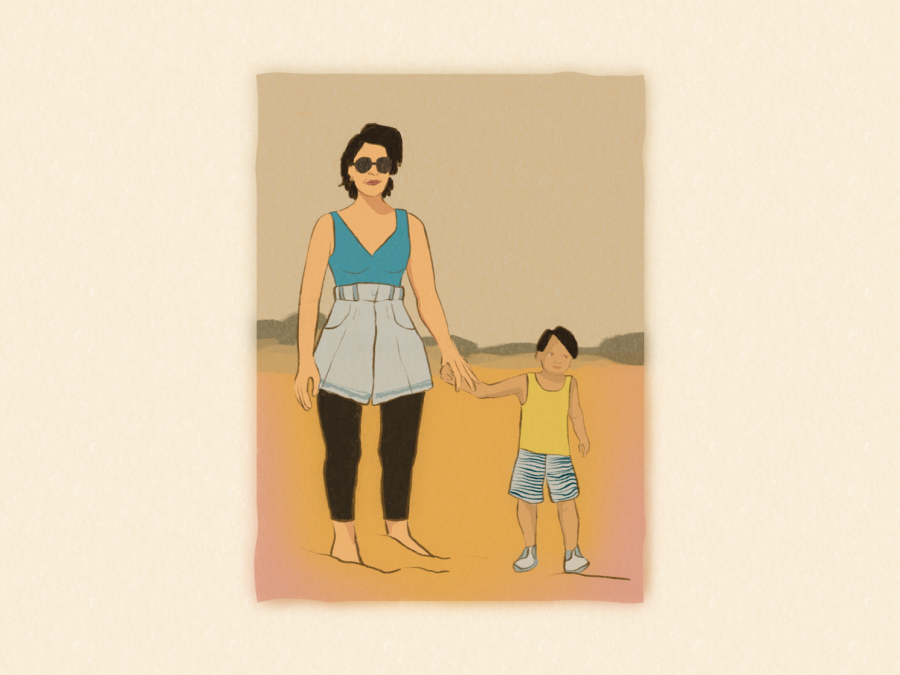Review: In ‘Time is a Mother,’ Ocean Vuong explores grief through the prisms of time and space
Published on April 5, 2022, Ocean Vuong’s new collection of writing situates the death of his mother within the remnants of memory and the potential of language.
“Time Is a Mother” is the latest poetry and prose collection by Ocean Vuong, remembering the passing of his mother. (Staff Illustration by Susan Behrends Valenzuela)
May 2, 2022
“I used to cry in a genre no one read,” Ocean Vuong writes in “Time is a Mother,” his most recent collection of poetry and prose. One of the most critically acclaimed contemporary poets, Vuong continues to explore the tenderness and weight of genre-bending writing in his work, particularly since the release of his debut novel “On Earth We’re Briefly Gorgeous.”
Written after the death of Vuong’s mother in 2019, “Time is a Mother” parses through themes of grief and mourning, stillness and change, and the differences between interior and public personas. Vuong’s voice is intricate but far from fragile as his attentive gaze turns to the magnitude of quotidian moments.
In “Time is a Mother,” Vuong’s mother’s face becomes a “thumbprint left over,” a cremated pet, a puff “of smoke / little ghost / poodles.” The collection is filled with the ghosts of experience as Vuong attends to the relationship between absence and presence. Through writing about the lives and deaths of others, Vuong illustrates the strange feeling of having gone through a moment before, whether in a past life or in another timeline.
Meditating on these haunting moments, Vuong transforms the laws of time and space in language that makes them both infinite and particular. In the piece “American Legend,” Vuong describes himself and his father in a car crash. The narrative collision lasts for pages as Vuong shifts between “the sudden / wetness warm / everywhere, he slammed,” a kitchen table and his father “shitfaced on hennessy.” His poems begin in a singular moment, allowing Vuong to draw the reader into a separate suspended sequence of other times and places until the prose returns to that initial moment which, despite us having barely moved at all, is now imbued with memory and meaning.
Within this space, Vuong never shies away from direct references to pop culture. Denny’s, Lil Peep and Leonard Cohen’s “Hallelujah” all make an appearance in a continual effort to implicate the shared reality of himself and the reader. Slices of iconography challenge and destabilize the tenderness that characterizes Vuong’s voice as he traverses the relationship between his affective understanding of the world and his interactional self.
Even in such a poignant collection, Vuong never completely abandons a critical tone as he incorporates politically charged topics like modern genocide and contemporary masculinity into his writing. A prime example is a line in the piece “Nothing”: “She didn’t look back as the train carried her, newly twenty, toward where I now stand, on a Sunday in Florence, Massachusetts, squinting at her faded scrawl: sift flour, then beat eggs until happy-yellow. The train will reach Dresden days before the sky is filled with firebombers.” The cornfields and gas stations of New England and the Midwest become ghosts of Vietnam and Auschwitz, turning quiet moments of Vuong’s life into haunting trails of history.
The stirring weight of “Time is a Mother” comes to light in a 13-page poem titled “Dear Rose,” an ode to Vuong’s mother. In some stanzas, he addresses her directly, writing: “I survived my life into yours.” In others, he addresses the reader, declaring, “are you reading this dear / reader are you my mom yet,” playing with perspective in literature. In Vuong’s writing, bodies and experiences collapse into each other as the author turns the embodied experience of mourning into a universal anchor for readers to grapple with the complexities of grieving.
“Dear Rose” ends with a bittersweet note on remembrance: “corpses I lay / side by side on / the page to tell you / our present tense / was not too late.” In “Time is a Mother,” grief is not always immediately visible, but its presence emerges in Vuong’s longing voice. As he intertwines memory with the present, time is turned not just into a body or a ghost or a landscape, but into a construction of language itself, locking us in a frozen moment before setting us free again.
Contact Katherine Williams at [email protected].


























































































































































